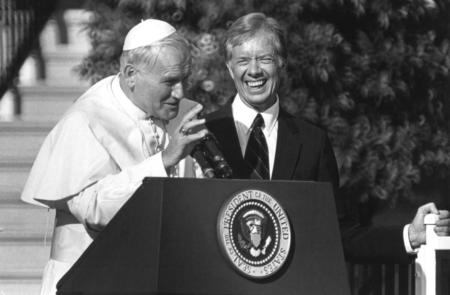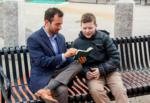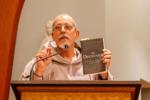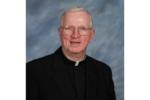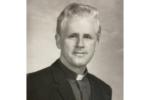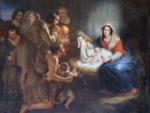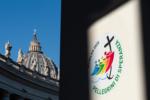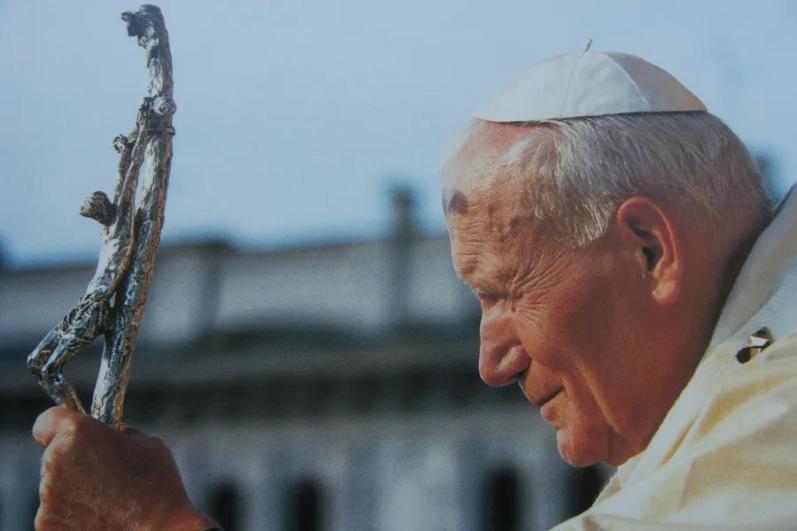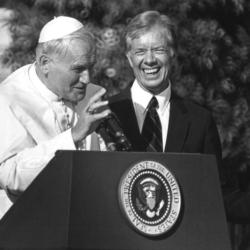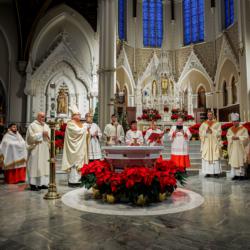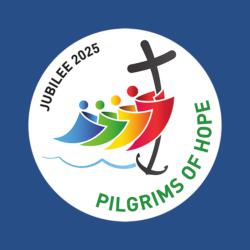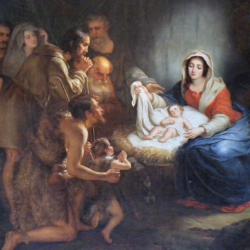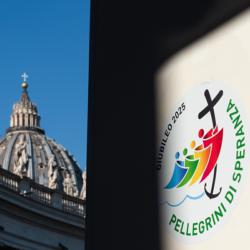George Weigel on what the Vatican can learn from JPII's diplomacy with Russia
John Paul II began his pontificate with the words "Be not afraid" -- a phrase that the Polish pope's biographer believes can be applied to Vatican diplomacy with Russia and China today.
George Weigel, author of the bestselling biography "Witness to Hope," spoke in Rome on May 18, the 102nd anniversary of St. John Paul II's birth.
John Paul II had a "determination to speak the truth no matter what ... to describe situations accurately, and to call tyrannical regimes to conversion," Weigel told CNA.
"I think that the antiphon 'Be not afraid' was embodied in this determination to speak truth to power, as he did at the United Nations in 1979 [and] to call communist regimes to honor the commitments they had made to human rights, especially religious freedom."
On John Paul II's birthday, Weigel delivered a lecture at the Angelicum, the pontifical university in Rome where the future pope studied from 1946 to 1948.
In his speech, Weigel outlined key lessons from "the statecraft of a saint," in particular with regard to the Holy See's diplomatic relationships with authoritarian regimes.
"As a keen student of the human condition, he understood that bad actors behave badly because of who they are, what they espouse, and what they seek, not because of anything 'we' did to 'them,'" Weigel said.
"Thus he could focus on the issues at hand -- religious freedom and other basic human rights in the communist world."
At a time when Pope Francis has faced criticism in some quarters for not condemning President Vladimir Putin by name and for not publicly addressing human rights violations in China, Weigel said that the Vatican ought to realize that "appeasement of communist regimes never works."
Weigel argued that the Vatican's pursuit of Ostpolitik, a diplomatic strategy championed by Cardinal Agostino Casaroli in the 1970s that avoided public condemnation of communism's human rights breaches for the sake of reaching diplomatic agreements, failed to achieve its goal of guaranteeing "the Church's freedom to live its sacramental life by its own standards."
"This unwillingness to grasp the lessons of the failures of the 1970s continues today. And it has seriously diminished the moral authority of the Vatican and the Catholic Church in world arenas," he commented.
Weigel said that the Holy See had revived Casaroli's Ostpolitik approach in its dialogue with the governments of Syria, Venezuela, Nicaragua, Cuba, China, and now Russia.
"Most recently, the return of the Casaroli approach has led to a sense of abandonment among Ukrainian Catholics, who recognize and lament the chimerical character of the stated intention of Vatican diplomacy to position itself as a broker between Ukraine and Russia," he said.
Weigel underlined that "St. John Paul II always insisted, correctly, that he was neither diplomat nor politician. He was, rather, a pastor, who in exercising his pastoral responsibilities had things to say to the world of political power."
"Time and again, in venue after venue, John Paul II lifted up the first freedom, religious freedom ... Because of that papal megaphone, the resistance Church behind the Iron Curtain knew it had a champion; those in the West committed to supporting the resistance Church in central and eastern Europe were inspired to intensify their efforts; and all the while, the Soviet rationale for its 'social model' was being systematically undercut in the order of ideas," he said.
John Paul II also listened to and honored the persecuted Church, which Weigel said had an important effect on the Holy See's diplomatic action in world politics at the time.
He added that this lesson could be put into practice today by listening to the voices of those living under the rise of an assertive China or facing the lethal threat posed by jihadism to Christian communities in Africa.
"Lifting up the witness of the living martyr-confessors publicly and persistently might also afford them a measure of protection, while helping to sustain islands of civil society essential to future progress toward justice and peace in Cuba, China, the Middle East, and Africa," he said.
Weigel also shared a story of how John Paul II rejected a proposal from the communist authorities in Poland in the mid-1980s to open a national dialogue on the country's future with the Church acting as an interlocutor.
The decision was based on John Paul II's ecclesiology that "the Church could not be a partisan political actor because that contradicted the Eucharistic character of the Church" and that, while "the Church formed the people who formed the civil society and the political institutions that did the work of politics, the Church as such was not a political agent, although the Church obviously had a voice in civil society."
John Paul II's witness, in this case, offers a lesson that "the cause of freedom, and the cause of the Church, are best served when statesmen and churchmen think long-term and do not bracket or minimize core principles for what can seem immediate advantage," he said.
This lesson, in particular, "should also raise cautions about the Holy See's evident push for full diplomatic relations with the People's Republic of China."
"In the present circumstances, any such deal would require the Vatican to sever its diplomatic exchange with the Republic of China on Taiwan -- the first Chinese democracy in history. What signal would such a deal, at such a price, send about the Catholic Church's vision of China's future?" he asked.
"What signal would it send about the Church's concern for the hard-pressed and often-persecuted elements of civil society that exist in China today and are pressing for a non-authoritarian and open future?"
In pursuing diplomatic strategies that require the pope and the Vatican to avoid public condemnation of human rights violations, the Holy See risks "losing its moral authority," he said.
"Vatican concessions ... have been made to a regime whose totalitarian character has been underscored by its stated determination to 'Sinicize' all religions, thus subordinating them to the party-state; by its internal handling of the COVID-19 pandemic (which it likely caused and certainly exacerbated); by its systematic violation of treaty-guaranteed civil liberties in Hong Kong; and by its genocide of the Muslim Uyghurs," Weigel said.
"I think this is a very sad situation, particularly with respect to China. The tepid response to the arrest of Cardinal Zen leads to the deterioration of the moral authority of the Holy See," he told CNA.
